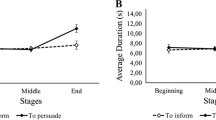Summary
Use of punctuation for pausing was investigated in a corpus of 20 German radio homilies by four speakers. Punctuation accounted for 91% of pause time and 84% of pause frequency in oral readings. Relative duration of pauses was according to punctuation type, as hypothesized. Pausing was also, as hypothesized, universal at paragraph positions and minimal at unpunctuated (null) positions. Commas accounted for 95% of the punctuated positions not used for pausing. Variation across speakers in the use of punctuation (commas in particular) in both writing and reading is interpreted as reflecting individual style. The viewpoint that syntactic analysis is a prerequisite for pausing in oral reading is discussed.
Similar content being viewed by others
References
Baldwin, R.S., & Coady, J.M. (1978). Psycholinguistic approaches to a theory of punctuation. Journal of Reading Behavior, 10, 363–376.
Brown, E., & Miron, M.S. (1971). Lexical and syntactic predictors of the distribution of pause time in reading. Journal of Verbal Learning and Verbal Behavior, 10, 658–667.
Butcher, A. (1981). Aspects of the speech pause: Phonetic correlates and communicative functions. Kiel, FRG: Institut für Phonetik der Universität Kiel.
Carver, R.P. (1970). Effect of a “chunked” typography on reading rate and comprehension. Journal of Applied Psychology, 54, 288–296.
Dillon, G.L. (1976). Clause, pause, and punctuation in poetry. Linguistics, 3, 5–20.
Duden (1980). Rechtschreibung der deutschen Sprache und der Fremdwörter, 18. Auflage, Band I. Mannheim: Bibliographisches Institut.
Fromkin, V., & Rodman, R. (1978). An introduction to language. New York: Holt, Rinehart, & Winston.
Goldman-Eisler, F. (1972). Pauses, clauses, sentences. Language and Speech, 15, 103–113.
Griffith, H. (1929). Time patterns in prose: A study in prose rhythm based upon voice records. Psychological Monographs, 39, 3, whole no. 179.
Grosjean, F., & Collins, M. (1979). Breathing, pausing, and reading. Phonetica, 36, 98–114.
Hegedüs, L. (1953). On the problem of the pauses of speech. Acta Linguistica Academiae Scientiarum Hungaricae, 3, 1–34.
Hieke, A.E., Kowal, S., & O'Connell, D.C. (1983). The trouble with “articulatory” pauses. Language and Speech, 26, 203–214.
Honan, P. (1960). Eighteenth and nineteenth century English punctuation theory. English Studies, 41, 92–102.
Kainz, F. (1967). Psychologie der Sprache (Vol. 4). Stuttgart: Enke.
Kainz, F. (1969). Psychologie der Sprache (Vol. 5, Part 2). Stuttgart: Enke.
Karger, J. (1951). Psychologische Ursachen von Sprechpausen. Doctoral dissertation, Universität Wien.
Knobloch, C. (1984). Sprachpsychologie. Tübingen: Niemeyer.
Kowal, S., Bassett, M.R., & O'Connell, D.C. (1985). The spontaneity of media interviews. Journal of Psycholinguistic Research, 14, 1–18.
Lange-Kowal, E.E. (1963). Langenscheidts Handwörterbuch Französisch (Part I). Berlin: Langenscheidt.
Neisser, U. (1976). Cognition and reality. San Francisco: Freeman.
O'Connell, D.C. (1982). Performance characteristics of poetry: Some cross-linguistic comparisons. Psychological Research, 44, 381–392.
O'Connell, D.C., & Kowal, S. (1984). Comparisons of native and foreign language poetry readings: Fluency, expressiveness, and their evaluation. Psychological Research, 46, 301–313.
Ong, W.J. (1944). Historical backgrounds of Elizabethan and Jacobean punctuation theory. Publication of the Modern Language Association of America, 59, 349–360.
Passy, P. (1906). Petite Phonétique Comparée des principales langues européennes. Leipzig: Teubner.
Sampson, E. (1981). Cognitive psychology as ideology. American Psychologist, 36, 730–743.
Schopenhauer, A. (1862). Parerga und Paralipomena: Kleine philosophische Schriften (Vol. 2). Berlin: Hayn.
Smith, F. (1982). Writing and the writer. New York: Holt, Rinehart, & Winston.
Snell, A.L.F. (1918a). An objective study of syllabic quantity in English verse. Publication of the Modern Language Association, 33, 396–408.
Snell, A.L.F. (1918b). Pause: A study of its nature and its rhythmical function in verse, especially blank verse. In F.N. Scott (Ed.), Contributions to rhetorical theory (Vol. 8). Ann Arbor, MI: Ann Arbor Press.
Thorndike, E.L. (1948). The psychology of punctuation. American Journal of Psychology, 41, 222–228.
Védénina, L.G. (1973). La transmission par la ponctuation des rapports du code oral avec le code écrit. Langue Française, 19, 33–40.
Vietor, W. (1904). Elemente der Phonetik des Deutschen, Englischen und Französischen (5th ed.). Berlin: Reisland.
Waller, R.H.W. (1980). Graphic aspects of complex texts: Typography as macro-punctuation. In P.A. Kolers and M.E. Wrolstad (Eds.), Processing of visible language (Vol. 2). New York: Plenum Press. pp. 241–253.
Wallin, E.W., Jr. (1901). Researches in the rhythm of speech. Studies from the Yale Psychological Laboratory, 9, 1–142.
Zwirner, E., & Zwirner, K. (1937). Phonometrischer Beitrag zur Frage der Lesepausen. Archives Néerlandaises de Phonétique Expérimentale, 13, 111–128.
Author information
Authors and Affiliations
Additional information
The first author wishes to express his gratitude to the Alexander von Humboldt Foundation, Bad Godesberg, West Germany, for the support of this project. A preliminary version was reported at the meeting of the Psychonomic Society, November 23, 1985, Boston, MA
Rights and permissions
About this article
Cite this article
O'Connell, D.C., Kowal, S.H. Use of punctuation for pausing: Oral readings by German radio homilists. Psychol. Res 48, 93–98 (1986). https://doi.org/10.1007/BF00309322
Received:
Issue Date:
DOI: https://doi.org/10.1007/BF00309322




